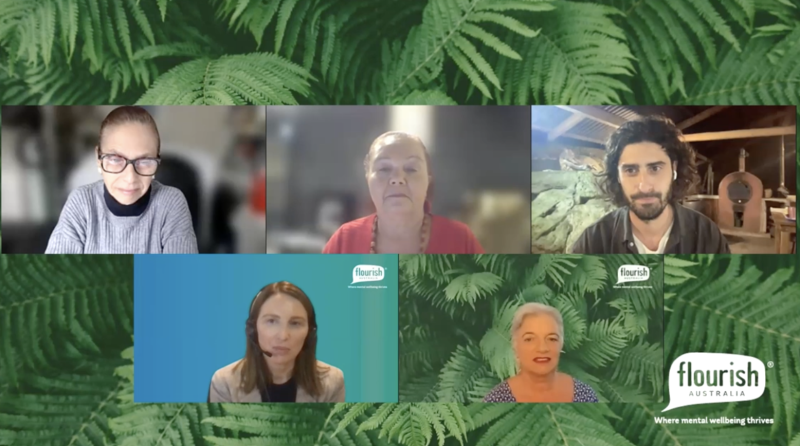
At our Let’s Do Lunch webinar on 27 October, in celebration of Mental Health Month, we were moved by hearing what our guest speaker, Associate Professor Simon Rosenbaum, is doing to make this happen!
Simon joined us from a remote part of Colombia where he is continuing his work with vulnerable communities and health professionals, from Bondi to Bangladesh.
Flourish Australia’s COO Susan McCarthy who facilitated the online event acknowledged that, “we know that even a small amount of physical movement can make a real difference to our daily mood and feelings.”
Following a moving Welcome to Country by Aunty Donna Ingram, Fay Jackson made a heartfelt acknowledgement of people with lived experience including those who have had painful experiences of the Mental Health System.
Professor Elizabeth Moore said “they are champions already”. And shared that as a classical ballet dancer, she understands the link between mind and body, “Stigma, body shaming and the effects of prescribed medications can be a block to participating in physical activity. It’s why we take a holistic view to personal wellbeing and recovery.”
How our guest speaker moved our mood!
A Physical Exercise specialist, Associate Professor Rosenbaum is helping mental health professionals in challenging environments around the world to not only embrace the wellbeing benefits of physical movement but take action to make taking part accessible to everyone. He emphasised
the importance of learning from each other to continuously improve our approach to healthcare.
“Here in Colombia, where multiple displacements, armed conflict and drug trade has given rise to an emergency of mental health, we can see potential for the innovative physical therapy approaches taking place, to lead the word.”
Simon believes participation in physical activity is a human right. As things stand however, he sees it as a privilege, out of reach for many of the people who would benefit the most. “To exercise, you need to have free time, live in a safe environment, have the right clothing, childcare and nutrition,” he explains.
A focus of Simon’s work is to identify ways to think beyond traditional gyms and create safe, accessible and inclusive places where people can participate in physical movement they enjoy.
Simon noticed that in refugee camps, playing sport attracted people, building community and social connections. But he was most interested in who was not present in that picture. “Women and people with disabilities were excluded. But physical movement isn’t about how we look, or just for the fit and able- bodied, it’s about the benefits for our mental wellbeing.”
“The significance of the Lancet Commission addressing the physical health of people living with a mental illness is an indication of just how important physical movement is,” Simon said. There was a strong recommendation, based on the evidence we have, for providing access to supervised, prevention-focused physical health programs. “It should be considered an international priority for reducing the impacts of mental health conditions,” Simon says.
The importance of enjoyment
Physical activity doesn’t need to be sport or exercise, “It could be going to the shops or stretching,” Simon explains. “What matters is that the person enjoys it. In Bangladesh, Women told us they would gather early in the morning before the men were up, and walk together as a way of relieving the tension of their situation.”
Simon spoke of the need to not only provide access to suitable equipment and psychologically safe places for people to participate in movement, but also up-skill the staff running programs in mental health first aid. “The quality of supervision is absolutely critical, “ Simon said. To illustrate the importance of delivery, he shared an example of a program in Northern Uganda which introduced a football program for child soldiers exposed to severe trauma. Community members were recruited as coaches but because they had no mental health training, and the only reference point they had for how to coach was to scream at someone from the sidelines, the concept failed as a positive intervention for participants.
We can’t just give someone a ball and think we’ve done mental health intervention
The focus of Simon’s work right now is bringing healthcare workforces closer together on effective integration of mental and physical aspects of wellbeing. In Bangladesh, he worked with professionals within the camp, brainstorming ways to introduce physical movement in meaningful ways for participants. “The ritual of prayer five times a day involved a form of physical activity for example,”
In his research around the world, Simon has identified three factors he feels can embed positive approaches within Australia’s allied workforce. 1. Engaging the culture of a mental health service with how physical movement might be integrated. 2. Training each side using insights of the other. 3. Developing ‘non-gym’ infrastructure within our communities that supports inclusive access to exercise.
This is where Addi Moves comes in!
A unique collaboration between a team of multi-skilled professionals and community members with lived experience, Simon has piloted an inclusive and accessible space at Marrickville’s Addison Road Community Centre, called Addi Moves.
“It’s been a process of creating a place that belongs to the people we have set out to support,” Simon says. “The co-designed, supported space for physical movement features a mural painted by refugees and asylum seekers and is completely unlike a commercial gym for atmosphere and accessibility.”
And it doesn’t stop there! Steps are being taken to have the space registered under a Work Development Order with Revenue NSW, meaning that people would be able to pay off fines by participating in physical movement programs.
Watch this space!
Flourish Australia is immensely proud to count Simon among our Flourish Foundation Australia Committee Members!
We can look forward to hearing more about the amazing outcomes of all he has happening in this space as things unfold.
Recording of the webinar (full version)
Talk to us today
For more information, contact us on 1300 779 270 or make an enquiry now.


